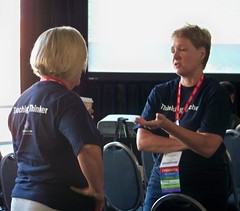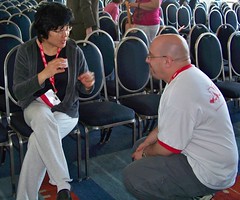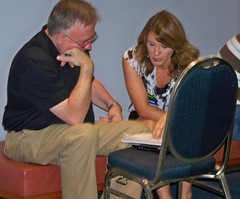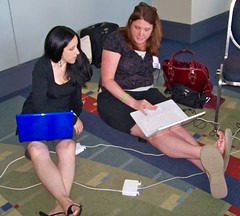
EdubloggerCon 2009 Reflections

Last year I was pretty critical of EduBloggerCon. For me it was too big, too scripted, and…well…you can read the post.
This year….smaller, deeper, and more thoughtful. Exactly what I was hoping for and personally what I need to push my own thinking. It was one of those days where you went to one but watch others via Twitter. You wanted to go to all the sessions…and in some ways you did via the conversations that happened between the actual sessions.
Last year I said it was too big…around 250 people. This year around 75 people….not a bad size.
 Last year it was to scripted….this year it was flexible, adaptable, and conversation based. Not adaptable enough for my taste but that was due more to the people that went than the organization of the sessions.
Last year it was to scripted….this year it was flexible, adaptable, and conversation based. Not adaptable enough for my taste but that was due more to the people that went than the organization of the sessions.
With empty sessions all over the wiki, nobody should complain that the conversation wasn’t what they needed. If you wanted a conversation the spots were available to put up a topic. I did just that wanting to discuss the changes that are happening with blogging because of Twitter and this whole “live stream” service (more on that later).
So….here are my take aways from EduBloggerCon 2009
 Best Practice of PD (My live notes)
Best Practice of PD (My live notes)
A great session that had a group of about 30 break into smaller groups, discuss ideas on what worked at our schools and then came back together to share as a group. We came to the same conclusions that it seems we always end up at:
- Getting administrators on board is key
- You have to meet teacher where they are
- There are different approaches, no one right model/way to shift teachers
- Change is hard
- Change is frustrating
Build Your Own Tool (My notes)
A great session that allowed us all to dream about the tool we would create if we had a coder. That’s exactly what Mark Wagner wanted out of the session and has had success with when he rents a coder to create applications for him.
Where School Reform Meets Madonna:
This session was too deep for me to even take notes on….I was too busy thinking about the conversation that was going on. It was a great intense hour with one liners that filled twitter faster than any single one person could type.
 My take away….or just good reminder…came from Scott McLeod when he reminded me that kids that are 14,15,16 years old are all about ME. How do we tap into that ME and make the world relevant to them? It’s where they are developmentally and it’s not a bad thing. These kids are trying to find out who they are, where do they fit, and the web and their web presence is a part of that. How do we tap into that ME, find what is passionate to them, and then find them an audience that makes learning relevant? It’s good to be reminded just where these kids are at. We talked about that they don’t use Twitter or blog because that is about spreading your message and not about ME. ME is about ME and my friends, it’s exactly what Facebook offers them…a place to hang out with their friends, talk with their friends, and be with their friends. Can we tap into this? Can we use this to our advantage? How do we use this in a learning enviornment? Should we?
My take away….or just good reminder…came from Scott McLeod when he reminded me that kids that are 14,15,16 years old are all about ME. How do we tap into that ME and make the world relevant to them? It’s where they are developmentally and it’s not a bad thing. These kids are trying to find out who they are, where do they fit, and the web and their web presence is a part of that. How do we tap into that ME, find what is passionate to them, and then find them an audience that makes learning relevant? It’s good to be reminded just where these kids are at. We talked about that they don’t use Twitter or blog because that is about spreading your message and not about ME. ME is about ME and my friends, it’s exactly what Facebook offers them…a place to hang out with their friends, talk with their friends, and be with their friends. Can we tap into this? Can we use this to our advantage? How do we use this in a learning enviornment? Should we?
Edu Blogging:
Lastly was a discussion I lead on where is EduBlogging heading and/or is it dead already?
 It was a good discussion that talked about how the conversation is changing. That at a point in time we use to actually take time to read and leave comments on blog posts. Now we read, and retweet blog posts. We talked about how Twitter is the new aggregator and is replacing RSS as a way people are getting their information. On this blog for example, I have more readers that come via Twitter then I do via the RSS feed.
It was a good discussion that talked about how the conversation is changing. That at a point in time we use to actually take time to read and leave comments on blog posts. Now we read, and retweet blog posts. We talked about how Twitter is the new aggregator and is replacing RSS as a way people are getting their information. On this blog for example, I have more readers that come via Twitter then I do via the RSS feed.
Because of Twitters live constant scrolling feed, we also talked about how the “life span” of a blog post is shrinking. I use to get comments on a blog post lasting weeks. Now I post a blog, it gets a comment or maybe two in a the first 10 minutes, gets retweeted for about 20 minutes and then it’s old news. I’ve also been running tests about the timing of blog posts. Being in Thailand I found that blog posts that I posted on my lunch hour had fewer views then those that got posted late at night. I have a theory this has to do with time zones as most educational twitters are in North America. So I’ve set different blog posts to go live at different times and have found that I get more readers on a blog post if it is posted around 3pm EST. This is a great time to release a blog post as educators on the east coast are just getting out of school and checking Twitter, while educators on the west coast are checking Twitter over lunch. Depending on the blog post I can see views fluctuate by the 100s.
 Now…please do not think that I’m all about the number of readers. It’s just an experiment that I’ve been running (and seeing I’m posting this at 11pm EST we’ll see how it goes) to see if the “life span” of blog posts are getting shorter…so far….I think they are.
Now…please do not think that I’m all about the number of readers. It’s just an experiment that I’ve been running (and seeing I’m posting this at 11pm EST we’ll see how it goes) to see if the “life span” of blog posts are getting shorter…so far….I think they are.
We then talked about our students blogging and what is the reason for it. David Warlick brought us back from a rant at one point to focus on that all of this, whether blogging, or twitter, or facebook updates, it’s all about conversations and communication. Yes, the conversations are changing. But in the end we’re just communicating with different tools. Whether it’s paint drawings on walls in a cave or quick 140 character Twitter messages. We have an internal need to communicate and that’s the fundamental skill we need to be teaching students.
So those are my “official” take aways from today. Of course all of these conversations have been had before, and could have been had on the web. The real reason I’m here are for all the conversations that can’t be had via the web. It’s shaki
ng hands, giving hugs, and just catching up. It’s the quick conversation over lunch or over a drink. It’s the time together with people that is the reason we all decend on Washington DC. I look forward to the rest of the conference and just being with other educational technologists.
Technorati Tags: EBC09, EBC, NECC09, NECC, Twitter, Facebook, Blogging







@jutecht Broken Link Blog Post: EduBloggerCon 2009 Reflections http://digg.com/u16rVx
#Twitter EdubloggerCon 2009 Reflections | The Thinking Stick: Yes, the conversations are changing. But i.. http://bit.ly/116HCv
EdubloggerCon 2009 Reflections | The Thinking Stick: Yes, the conversations are changing. But in the end we'.. http://bit.ly/18aYN5
EdubloggerCon 2009 Reflections | The Thinking Stick: Yes, the conversations are changing. But in the end we'.. http://bit.ly/HqDzo
EdubloggerCon 2009 Reflections | The Thinking Stick: Yes, the conversations are changing. But in the end we’.. http://bit.ly/HqDzo
EdubloggerCon 2009 Reflections | The Thinking Stick: That at a point in time we use to actually take time to rea.. http://tinyurl.com/lk2ehc
EdubloggerCon 2009 Reflections | The Thinking Stick http://bit.ly/15h7Zm
Just read @jutecht Broken Link Blog Post: EduBloggerCon 2009 Reflections http://digg.com/u16rVx (via @KD9SR)
@dobrien917 Hey, fellow educator! @jutecht got me thinking with his blog post http://tinyurl.com/lk2ehc #ebc09 Wanna check out Gladwell L8R
Jeff,
Interesting stuff here. One part in particular caught my attention:
“the ‘life span’ of a blog post is shrinking.”
I have been debating the value of blogging for the better part of 2009. I dabbled a little as part of my trip to Doha for Flat Classroom, but it was mainly as a way to “bring” the students, families and faculty at my school on the trip with me.
Obviously the fact that I read this post by you is proof that sharing your thoughts/feelings via this medium has some purpose. I just wonder about the “opportunity cost” of blogging on a regular basis.
Blogs aren’t works of art, they are ephemeral pieces but they still take time and effort to maintain. I don’t claim to have the answer to the question, but I wonder if blogging is the best use of our time.
I recently did a project with my students comparing “slow blogging” and twitter. Slow blogging is about only writing when you have something of real, lasting value to share. It is about taking the time to let thoughts marinate in your brain before sharing them with the world.
I think there is something to the idea, but in our culture, old news is usually just old news.
Thanks for making me think with this post. I’d be interested in reading your thoughts about “slow blogging” if you are familiar with the concept.
One added value of blogging is a record of your thoughts. I have been blogging since 2005 and it is only now that I am realizing I can look back a few years and see what I said about certain things.
[…] EdubloggerCon 2009 Reflections […]
I agree with you that getting administrators (at all levels) on board is key. How do we get them to pay more than lip service? How do we get them modeling the tools, the skills, walking the walk so to speak? I hope there are many more conversations around this.
I am with you regarding your opening thoughts. From the very first moments of Edubloggercon, you could sense community. Meeting virtual friends in person for the first time is an amazing experience. The number in attendance was perfect, allowing opportunities for more people to contribute to the conversation. Those conversations were thoughtful and purposeful. Many of the discussions I had were not just about the sessions. They were exchanges of deep thoughts and ways we could contribute to each others experiences in learning and teaching.
BTW, great to meet you in person. Thanks for including my pic on your blog! Catch you later.
Jeff, this captures many of my feelings about Saturday as well. I had a great time last year but this year had a different feel – more relaxed, perhaps.
Thanks for a fabulous session in the afternoon. I know it will be one of the highlights of my NECC experience and look forward to seeing you in the Edubloggers lounge over the next couple of days. Maybe you can help me think through the pros and cons of moving to WordPress from TypePad!
[…] Utecht, also writing reflectively about EduBloggerCon09, noted: This year….smaller, deeper, and more thoughtful. Exactly what I was hoping for and personally […]
[…] Jeff Utecht via Stephen Downes says: It was a good discussion that talked about how the conversation is changing. That at a point in time we use to actually take time to read and leave comments on blog posts. Now we read, and retweet blog posts. We talked about how Twitter is the new aggregator and is replacing RSS as a way people are getting their information. On this blog for example, I have more readers that come via Twitter then I do via the RSS feed. Because of Twitters live constant scrolling feed, we also talked about how the “life span†of a blog post is shrinking. I use to get comments on a blog post lasting weeks. Now I post a blog, it gets a comment or maybe two in a the first 10 minutes, gets retweeted for about 20 minutes and then it’s old news. […]
Jeff–
I come to NECC for all of those same reasons…thus Iam just getting to my reader but I wanted to be sure to comment as I was really intrigued by your conversation at EBC…one thing that wasn’t mentioned was folks who read posts through their readers without ever coming to the site to visit or comment. I wonder if twitter BRINGS folks to the site that might ordinarily only “get to it” when they have time.
Just a thought–was good to see you!
Jeff, I think you make some very interesting points about how Twitter is replacing RSS readers. I haven’t checked my feeds in a long while, and come to think of it Twitter and FB have been serving as my main learning network for awhile now. I think a lot of it, for me, has to do with the iPhone as well. I think the interface of the iPhone, which I have given myself over to, lends itself much more to apps like Tweetie, whereas Google Reader is a bit cumbersome. You’ve articulated something here that I hadn’t thought of, and that alone is a reason why blogs serve a valid and useful purpose.